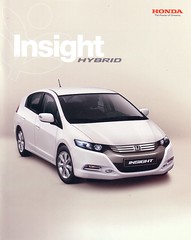 Image via Wikipedia
Image via Wikipedia
Here's the Environmental Protection Agency's breakdown of the most fuel-efficient vehicles in each major vehicle class. Remember that vehicles rarely, if ever, actually meet the EPA numbers. But they are useful in comparison shopping.
Two-seater cars
Honda Insight
Engine size: 3 cyl, 1 L
Transmission: manual
Miles-per-gallon city/highway: 61/66
Honda Insight
Engine size: 3 cyl, 1 L
Transmission: automatic variable
Miles-per-gallon city/highway: 57/56
Minicompact cars
Mini Cooper
Engine size: 4 cyl, 1.6 L
Transmission: manual
Miles-per-gallon city/highway: 28/36
Mini Cooper
Engine size: 4 cyl, 1.6 L
Transmission type: automatic
Miles-per-gallon city/highway: 26/34
Subcompact cars
Volkswagen New Beetle (diesel)
Engine size: 4 cyl, 1.9 L
Transmission: manual
Miles-per-gallon city/highway: 38/46
Volkswagen New Beetle (diesel)
Engine size: 4 cyl, 1.9 L
Transmission type: automatic
Miles-per-gallon city/highway: 36/42
Compact cars
Honda Civic Hybrid
Engine size: 4 cyl, 1.3 L
Transmission type: automatic variable
Miles-per-gallon city/highway: 48/47
Honda Civic Hybrid
Engine size: 4 cyl, 1.3 L
Transmission type: manual
Miles-per-gallon city/highway: 46/51
Midsize cars
Toyota Prius (hybrid)
Engine size: 4 cyl, 1.5 L
Transmission type: automatic variable
Miles-per-gallon city/highway: 60/51
Hyundai Elantra
Engine size: 4 cyl, 2 L
Transmission type: manual
Miles-per-gallon city/highway: 27/34
Large cars
Chevrolet Malibu MAXX
Engine size: 6 cyl, 3.5 L
Transmission type: automatic
Miles-per-gallon city/highway: 22/30
Small station wagons
Volkswagen Jetta Wagon (diesel)
Engine size: 4 cyl, 1.9 L
Transmission type: manual
Miles-per-gallon city/highway: 36/47
Volkswagen Jetta (diesel)
Engine size: 4 cyl, 1.9 L
Transmission type: automatic
Miles-per-gallon city/highway: 32/43
Midsize station wagons
Volkswagon Passat Wagon (diesel)
Engine size: 4 cyl, 2 L
Transmission type: automatic
Miles-per-gallon city/highway: 27/38
Ford Focus Station Wagon
Engine size: 4 cyl, 2L
Transmission type: manual
Miles-per-gallon city/highway: 26/35
Cargo vans
Chevrolet Astro 2WD
Engine size: 6 cyl, 4.3 L
Transmission type: automatic
Miles-per-gallon city/highway: 16/22
GMC Safari 2WD
Engine size: 6 cyl, 4.3 L
Transmission type: automatic
Miles-per-gallon city/highway: 16/22
Minivans
Honda Odyssey
Engine size: 6 cyl, 3.5 L
Transmission type: automatic
Miles-per-gallon city/highway: 20/28
Dodge Caravan
Engine size: 4 cyl, 2.4 L
Transmission type: automatic
Miles-per-gallon city/highway: 20/26
Passenger vans
Chevrolet Astro 2WD
Engine size: 6 cyl, 4.3 L
Transmission type: automatic
Miles-per-gallon city/highway: 16/21
GMC Safari 2WD
Engine size: 6 cyl, 4.3 L
Transmission type: automatic
Miles-per-gallon city/highway: 16/21
Sport utility vehicles
Ford Escape Hybrid
Engine size: 4 cyl, 2.3 L
Transmission type: automatic variable
Miles-per-gallon city/highway: 36/31
Toyota Rav4 2WD
Engine size: 4 cyl, 2.4 L
Transmission type: manual
Miles-per-gallon city/highway: 24/30
Standard pickup trucks
Ford Ranger Pickup 2WD
Engine size: 4 cyl, 2.3 L
Transmission type: manual
Miles-per-gallon city/highway: 24/29
Ford Ranger Pickup 2WD
Engine size: 4 cyl, 2.3 L
Transmission type: automatic
Miles-per-gallon city/highway: 22/26
Mazda B2300 2WD
Engine size: 4 cyl, 2.3 L
Transmission type: manual
Miles-per-gallon city/highway: 24/29
Mazda B2300 2 WD
Engine size: 4 cyl, 2.3 L
Transmission type: automatic
Miles-per-gallon city/highway: 22/26
Source: Fueleconomy.gov
Please note that many vehicles come in a range of engine sizes and trim lines, resulting in different fuel economy values.
![Reblog this post [with Zemanta]](http://img.zemanta.com/reblog_e.png?x-id=1b40b09a-4ad0-426e-9de6-41cddf879a49)


![Reblog this post [with Zemanta]](http://img.zemanta.com/reblog_e.png?x-id=18cbdfae-5428-4a25-ac29-83cdc28d915e)